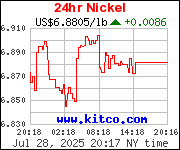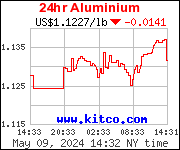3003 H14 Aluminum: What You Need to Know
If you’re looking for a versatile, highly workable metal for your next project, 3003 H14 aluminum is worth looking into. The temper’s excellent corrosion resistance and good workability make it a popular choice for a wide range of food and chemical applications, heat exchangers, storage tanks, and roofing sheets. Aluminum alloys in the 3000 series have manganese as their primary alloying element, and 3003 aluminum is no exception. Aluminum and manganese come together to create a...
Read MoreComparing 3105 Aluminum vs. 5052 Aluminum
There’s a reason that aluminum is a popular choice for so many applications. Its high strength-to-weight ratio, corrosion resistance, and workability make it well suited for multiple industries — and its typically wallet-friendly price tag puts it comfortably inside most budgets. But since alloying elements can enhance or diminish the native characteristics of a metal, it’s important to choose an aluminum alloy that has properties that suit your application’s needs. Here,...
Read MoreComparing 3003 aluminum vs. 6061 aluminum
It’s no surprise that aluminum is so popular. Its strength and light weight make it ideal for a wide variety of applications and industries, from providing structural integrity and fuel economy for vehicle manufacturers to giving strength and corrosion resistance to shipbuilders concerned with saltwater corrosion. But pure aluminum itself is relatively soft and not very strong. It’s the alloying elements, tempering, and treatment that enhance its characteristics, making it much more...
Read More5052 H32 Aluminum: Everything You Need to Know
Looking for a strong, lightweight metal that can stand up to harsh conditions? 5052 H32 aluminum may be just what you’re looking for. Not only does it perform well in marine, industrial, and other corrosive environments, but its excellent formability also makes it an ideal candidate for making road signs, fuel tanks, boat hulls, and other durable products. But what is 5052 H32 aluminum? What makes it so strong? And why is it more formable and corrosion-resistant than many other aluminum...
Read More3003 vs. 3105 Aluminum: How They Stack Up
Aluminum has many valuable properties that make it popular in a wide range of industries. Its high strength, low weight, corrosion resistance, and ease of fabrication make it suitable for many different applications. 3003 aluminum is one of our most requested grades, and we’re often asked about how it compares to 3105 aluminum. The difference between 3003 and 3105 aluminum As with other metals, higher strength is desirable for high-stress applications, but may be less-than-ideal for...
Read More5052 aluminum vs. 3003 — what to know when evaluating
Aluminum is a durable metal that many industries rely on. Its high strength-to-weight ratio, low weight, ease of fabrication and good corrosion resistance make it highly versatile and a good choice for a wide variety of applications. Two popular grades are 5052 aluminum and 3003 aluminum. Differences between 3003 aluminum and 5052 aluminum When it comes to metals, high strength can be an asset when you need rigidity and resilience or a liability when your application requires molding or...
Read More

